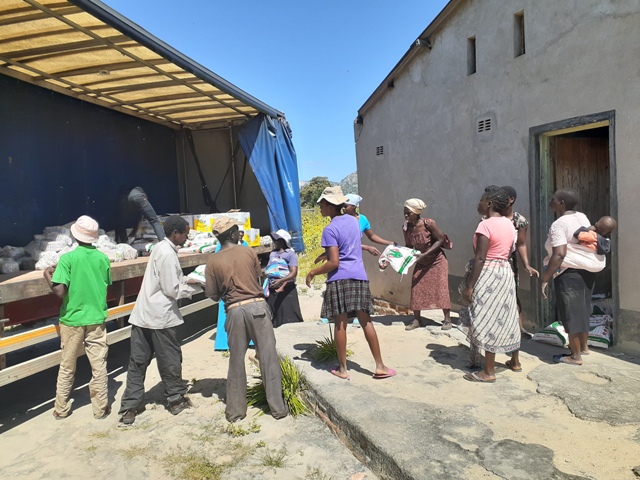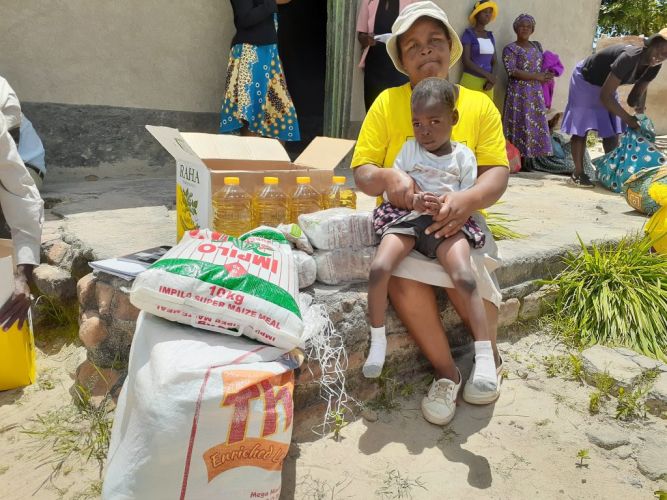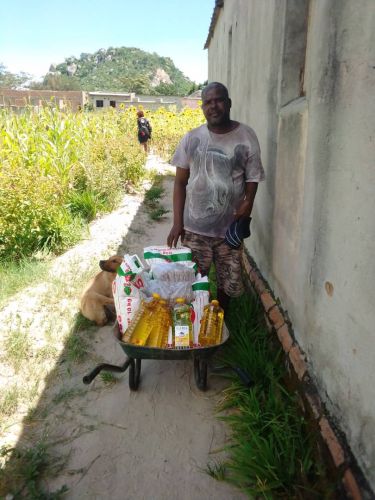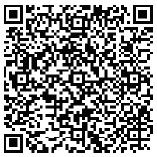Under the growing threat of coronavirus, We have gone through a shortage of toilet paper and rice, which already worried the city on a grand scale. However, on the other side of the world, Zimbabwe is suffering from a severe shortage of food. Zimbabweans have long been encountering the threat of famine, putting them to live in a constant state of anxiety.
A meal does not come easily
Southern Africa is currently suffering from the serious drought over the past few decades, and Zimbabwe is one of the most affected areas. Almost half of the population in Zimbabwe (close to 8 million) is lack of the providence of food, in which 90% of the infants are malnutritional. It was reported that people have run out of staple mealie meal, which makes it very difficult for the impoverished even to consume a single meal daily.
Our partner in Zimbabwe told us that the underprivileged were addressing the food crisis by reducing their daily meals from three times to only one time a day, increasing consumption of wild foods, and even begging on the streets. Children are forced to drop out of school to save up the expenditure of the household while some women are forced by reality to become prostitutes in order to earn a living for their families.
While some parts of the country experienced a brief respite in January with sporadic rains, it was far from enough to rescue the agricultural losses. With temperature rise in sorthern African soaring two times more than other places in the globe, in addition to a shortened rain season, the most deplorable victims are unquestionably the poor farmers.
What is even more concerning is the economic predicament faced by the country. There has been a rapidly increasing unemployment rate as well as annualised inflation, which has skyrocketed to 521% last December. Hyperinflation resulted in extortionate seeds and fertilizers for small farmers. Conversely, the value of savings has kept depreciating over the years. With the overlapping tragedy of national economy collapse and the deadly drought, it is undoubtedly bringing people in Zimbabwe to the brink of death.
CEDAR’s emergency aid
To mitigate the threat of famine, CEDAR allocated funds of over HK$160,000 to our Christian partner EFZ[1] in supporting the fragile community of Dora, the eastern district of the country. In fact, our partner has implemented a two-year disaster risk reduction project across 12 villages in Dora since May last year, which has proven to be effective. Nonetheless, the area was attacked by the fall armyworms that devoured the corn crops, resulting in nearly half of the farmers’ households had their corn fields affected. The relief work this time ensures that residents are guaranteed with primary access to food, that they will not resort to coping mechanisms such as trading household assets for food. It also allows us to consolidate our achievements for the local disaster risk reduction project, thus helping the residents to secure their livelihood.
Our emergency aid lasts for six months, in which we estimate that 60 vulnerable families (240 people in total) will be benefited. Our action plan includes 1) distributing food (beans, oil, and mealie meal) to help them through their most difficult times; 2) distributing seeds and fertilisers; 3) providing training on conservative agricultural farming to help farmers combat the long-term effect of climate disaster on crops, so that the harvest can be preserved.
“Then the King will say to those on his right, ‘Come, you who are blessed by my Father; take your inheritance, the kingdom prepared for you since the creation of the world. For I was hungry and you gave me something to eat, I was thirsty and you gave me something to drink, I was a stranger and you invited me in, I needed clothes and you clothed me, I was sick and you looked after me, I was in prison and you came to visit me.’” (Mathew 25:34-36)
[1] EFZ, full name Evangelical Fellowship of Zimbabwe, is an evangelical association in Zimbabwe. Members include over 250 churches in the country of various denominations.
donation method
(please specify: Hunger Relief in Zimbabwe)
Cheque
Please make it payable to CEDAR FUND
Direct Deposit
HSBC: 004-600-385678-001
BEA: 015-185-68-00931-7SSA
BOC: 012-581-2-020114-7
DBS: 016-478-001364162
Faster Payment System
FPS ID: 3354016 or scan the below code in the online banking
After donation, please send a completed Donation Form, enclosing with cheque, bank-in slip or screenshot of successful payment along with your name, contact phone number and mailing address to us via mail, email or WhatsApp.
Address: CEDAR Fund, G.P.O. Box 3212, Hong Kong
Email: sharing@cedarfund.org
WhatsApp (for donation matters only): 5160 7549
- CEDAR is an approved charitable institution and trust of a public character under section 88 of the Inland Revenue Ordinance. Please visit Inland Revenue Department website for details.
- CEDAR Fund will issue a receipt for a donation of HK$100 or above for tax deduction. For a donation of less than HK$100, please get in touch with us to issue a receipt.
- Please DO NOT fax any donation information.
If the donation exceeds the above mentioned allocation of funds, the excess amount will be transferred to CEDAR’s ‘Emergency Relief and Disaster Preparedness Fund’. The fund will enable us to respond to immediate needs, and support disaster mitigation in poor nations always being hit by disasters to reduce the amount of devastation.






